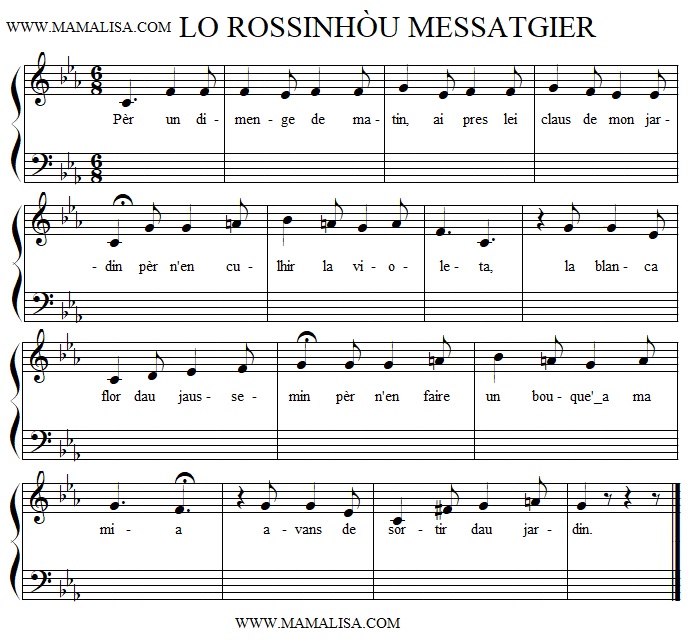Lo rossinhòu messatgier
This song is a Provençal song.
Lo rossinhòu messatgier
The Messenger Nightingale
Folk Song
Folk Song
(Occitan)
(English)
Pèr un dimenge de matin
Ai pres lei claus de mon jardin
Pèr n'en culhir la violeta
La blanca flor dau jaussemin
Pèr ne'n fair' un boque' a ma mia
Avans de sortir dau jardin
Quand lo boquet es estat fach
Sabiáu pas pèr cu lo mandar
L'i a 'gut lo rossinhòu sauvatge
Lo messatgier deis amorós:
"Pèr ieu, vòs-tu fair' un messatge
A ma mia, la Blancaflor?"
Lo rossinhòu a pas mancat
Dau jòli* bòsc s'es envolat
Sus la fenèstra de la bèla
Lo rossinhòu a fach tres torns:
"Revelhatz-vos, la graciosa,
Vos aduse un boquet de flors!"
Que Dieu benisse* lei saluts
E mai aqueu que leis adutz
Ne'n ai bèn d'autres calenhaires
Ne'n ai bèn d'autreis amorós
Ne'n ai bèn d'autres calenhaires
Mai pèr aqueu pòrta la flor.
"Bèla, quand siáu en quauqua part
Parle de vos, siáu jamai las,
Parle que de vòstrei "louangis*"
Ambé de vòstre bòn renom
Que siatz polida coma un "angi*",
Semblatz la filha d'un baron!"
One Sunday morning
I took the keys to my garden
To pick violets,
White jasmine flowers
To make a bouquet for my sweetheart
Before leaving my garden.
When the bouquet was made
I didn't know who to send it with,
There was the wild nightingale,
The lovers' messenger:
"Will you take a message for me
To my sweetheart, Whiteflower."
The nightingale didn't fail,
He flew from the pretty woods
To the beauty's window
The nightingale turned three times,
"Wake up, you gracious one,
I bring you a bouquet of flowers!"
"May God bless the greetings
As well as the one who brings them.
I do have other suitors,
I do have other lovers
I do have other suitors
But for this one, it brings the flowers."
"Beauty, when I am somewhere,
I talk about you, I'm never tired,
I talk only about your praises,
And about your good name
That you're pretty like an angel,
You look like a baron's daughter!"
Notes
*The words with an asterisk are provençalized French words.
Collected by Damase Arbaud in "Chants populaires de la Provence", 2, published in 1864
Also published in 1977 and 1994 in "Cantam provençau, cançonier dau calen" by Luciana Porte-Marrou.
Below are the lyrics as first written down by Damase Arbaud. They're written in what we call "Mistralian form"*:
Par un dimenche de matin
Ai près les claus de moun jardin,
Per n'en culhir la viouleto,
La blanco flour doou jaussemin
Per n'en fair' un bouque' à ma mio
Avant de sourtir doou jardin.
Quand lou bouquet es istat fach
Sabiou pas par qu lou mandar,
L'y agut lou roussignoou sauvagi,
Lou messagier des amourous:
Per iou voues-tu fair' un messagi
A ma mio la Blancoflour,
Lou roussignoou n'a pas manquat
Doou joli bouesc s'es envoulat,
Sur la fenestro de la belo
Lou roussignoou a fach très tours :
Reveilhetz-vous, la graciouso,
Vous adus' un bouquet de flours.
Que Diou bénisse les saluts
Et mai aqueou que les adut,
N'en ai ben d'autres caregnaires
N'en ai ben d'autres amourous,
N'en ai ben d'autres caregnaires,
Mai per aqueou pouerto la flour
« Belo, quand siou en quauquo part
» Parle de vous, siou jamai las,
» Parle que de vouestres louangis
» Eme de vouestre bouen renoum,
» Que siatz pourido coum' un angi,
» Sembletz la filho d'un baroun. »
*Occitan language has two main written forms:
1. The normalized or classic written form (a.k.a. Alibert's written form) is based on the troubadour spelling - it was modernized at the end of the 19th century and fixed by Louis Alibert in the 1930's.
2. The felibres' written form (a.k.a. Mistralian written form) is based on French spelling - it was fixed by Joseph Roumanille in the second half of the 19th century. It's mainly used in East Occitania (Provence, Nice) and was used by Frederic Mistral –hence the name. The "felibres" were Provençal writers who decided to defend and promote the Provençal language and literature in the 1850's. (Cf. Wiki entry)

Thanks and Acknowledgements
Translated by Monique Palomares with Lisa.

























